What Security Risk Does a Public WiFi Connection Pose?
Most people these days rely on public WiFi connections to get work done, whether they’re at a coffee shop or the airport. But what many don’t realize is that these connections are far from secure. If you are wondering, “what security risk does a public WiFi connection pose?” then you might be surprised to realize that is more than one.
In this article, you will discover which risks you might encounter by connecting to public WiFi. This can be particularly interesting if you are a small business owner and want to offer a secure connection. Moreover, you will learn how to mitigate these risks and prevent problems.
Why Public WiFi Is Unsafe
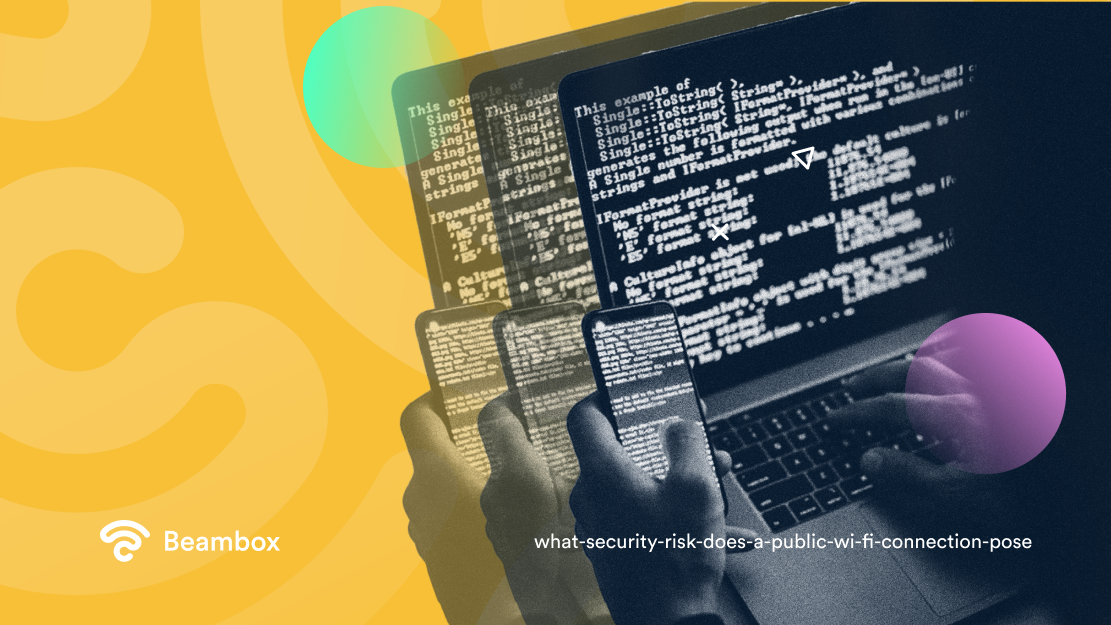
Public WiFi is becoming increasingly popular as people look for ways to save data on their mobile devices. However, public wifi is often unsafe and not compliant with privacy laws.
The reason why public WiFi is unsafe is that the network can be freely accessed by anyone. Both normal people and malicious actors like hackers.
From a technical point of view, there are several reasons why public wifi is unsafe. For example public networks are usually not encrypted or not protected by passwords. Moreover,people use it to transmit sensitive pieces of information such as banking details or documents.
On a public WiFi that has not been properly secured, hackers can then access the data on any devices that are connected to the network, including laptops, smartphones, and tablets.
Moreover, it is likely that users are not using any software or hardware solution to strengthen the security of their own devices. Therefore hackers will have an easy life committing cybercrimes like identity theft, financial fraud, or blackmail.
Let’s see which are the main security risks that a public WiFi connection poses.
#1 - What Security Risk Does a Public WiFi Connection Pose? Loss of Privacy
The first security risk that a public WiFi connection poses is privacy. With so much of our lives being lived online, it’s important to be aware of the risks that come with using public WiFi networks.
One of the biggest risks of using public WiFi is that your personal data could be compromised. When you connect to a public network, you’re essentially accessing a connection that can be accessed by anyone else. Therefore, your laptop or smartphone is visible on the network and exposed to attack.
The privacy risk involved with a WiFi connection is that your activity online can be tracked, and information can be stolen and used against you. This can lead to blackmail and other types of sophisticated fraud based on data that you shared online.
#2 - What Security Risk Does a Public WiFi Connection Pose? Stealing Sensitive Data
The second security risk that a public WiFi connection poses is the possibility that hackers steal your sensitive data, such as documents, passwords, or bank details.
When it comes to stealing sensitive data, public WiFi in a crowded area is the weapon of choice for many hackers. That’s because WiFi networks are often unsecured, making them easy targets for anyone looking to steal confidential information.
There are a few different ways that hackers can exploit WiFi networks in order to steal sensitive data. One popular method is known as “sniffing”, which involves using special software to intercept and read data being transmitted over the network.
Another common method is “man-in-the-middle” attacks, where hackers insert themselves into the communication between two devices in order to eavesdrop on or even manipulate the data being exchanged.
These types of attacks might lead to financial fraud and identity theft. Therefore, be aware of what type of data you are sharing on the internet when you use public WiFi.
#3 - What Security Risk Does a Public WiFi Connection Pose? Malware and Virus
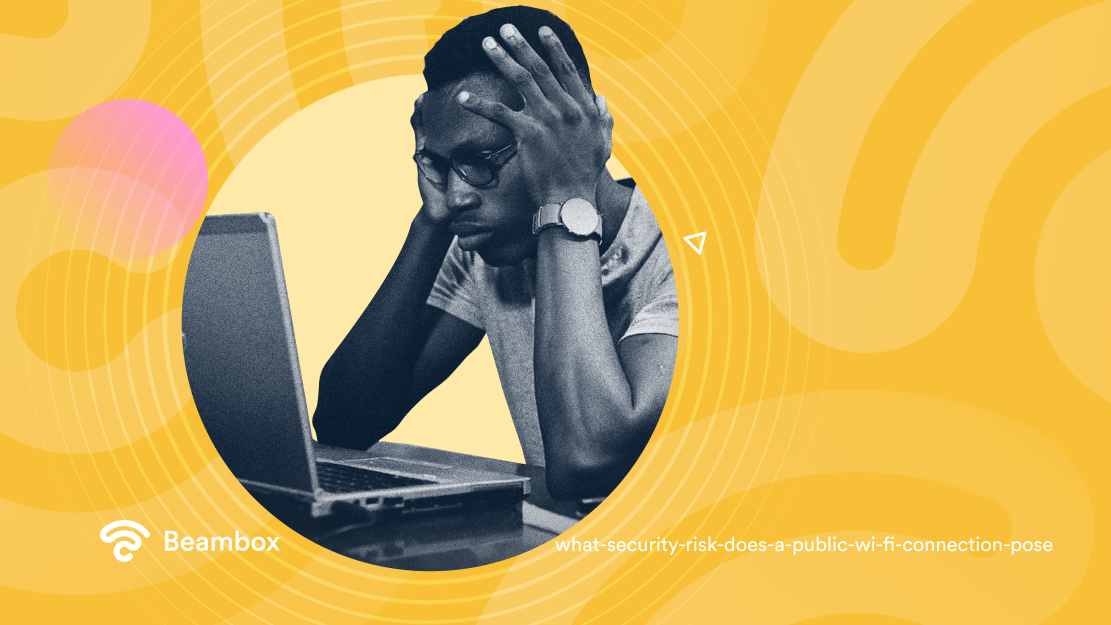
The last security risk that a public WiFi connection poses is the installation of Malware and Viruses.
These are little pieces of software that are installed on the victim’s device and can perform a variety of actions. From bothering the user with ads to stealing data, breaking the device, or even mining cryptocurrencies.
Moreover, sophisticated malware is hard to detect and can literally take over the device. If a malicious actor takes over your device, that person can spy on your device, or even block and ask for a ransom to unlock it.
If you connect to a public WiFi network and accidentally download a piece of malware, it could lead to serious problems.
WiFi Technological Improvement: WiFi 6 Security
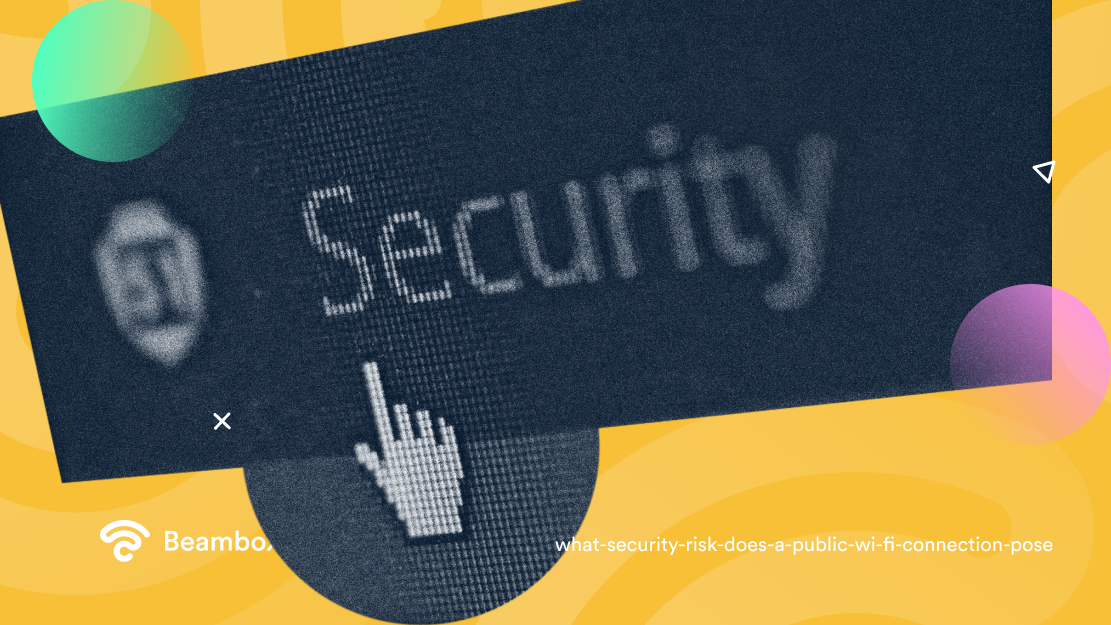
WiFi 6 is the next generation of WiFi technology, and it’s faster and more efficient than current 2.4 GHz and 5 GHz WiFi. It can go 10x faster than traditional WiFi and 6 is ideal for gaming and other data-intensive activities.
Moreover, WiFi 6 can handle more devices on the same network without sacrificing speed or performance. This is fantastic for small businesses offering free WiFi to a large pool of guests.
WiFi 6 security is also better than current WiFi technology. WiFi 6 uses advanced encryption methods to keep data safe and embeds automatically firewalls to protect your network from attacks.
Although WiFi 6 is not available everywhere, Internet Server Providers (ISP) and hardware manufacturers are working collectively to make this technology available everywhere.
What Does WiFi Risk Detected Mean?
If you have installed an antivirus or a malware detector, you might be wondering what does WiFi risk detected means.
Such types of software scan your connection and web pages to ensure that you are not running into trouble. Therefore, this type of notification is there to ensure that you know what you are doing and are visiting only trustworthy websites.
However, these software solutions are far from perfect. Sometimes, these notifications pop up without any real existing threat and they can also prevent you from visiting harmless web pages.
If these notifications show up frequently you might need to check your current settings or switch to another antivirus solution.
How to Mitigate the Security Risks Posed by a Public WiFi Connection
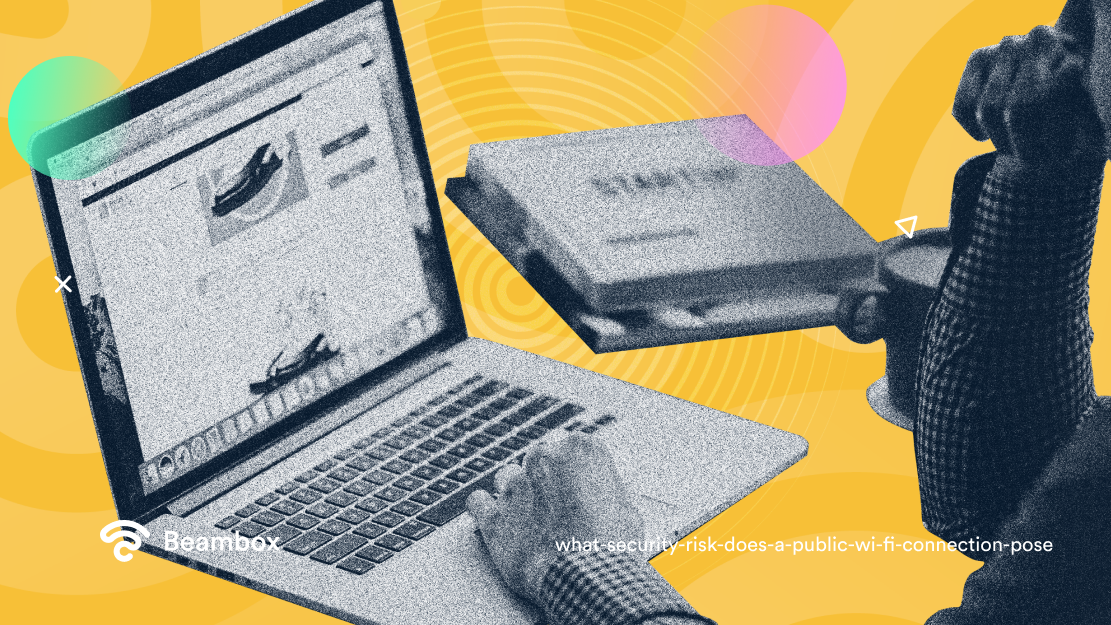
So far you saw what security risk does a a public WiFi pose. As you read, a malicious actor can intercept your online activity and cause you or your customers a different range of troubles.
While there is no possible way to eliminate any risk of connecting to the internet, there are other things you can do. Internet users can implement actions that secure the network and disincentivize hackers from attacking.
Here is a breakdown of the most useful and effective way to mitigate the security risks posed by a public WiFi connection. If you connect to public WiFi in an airport, a train station, or a square, implementing these solutions will make your web experience way safer.
#1 Method to Mitigate the Security Risks Posed by a Public WiFi Connection: Use a VPN
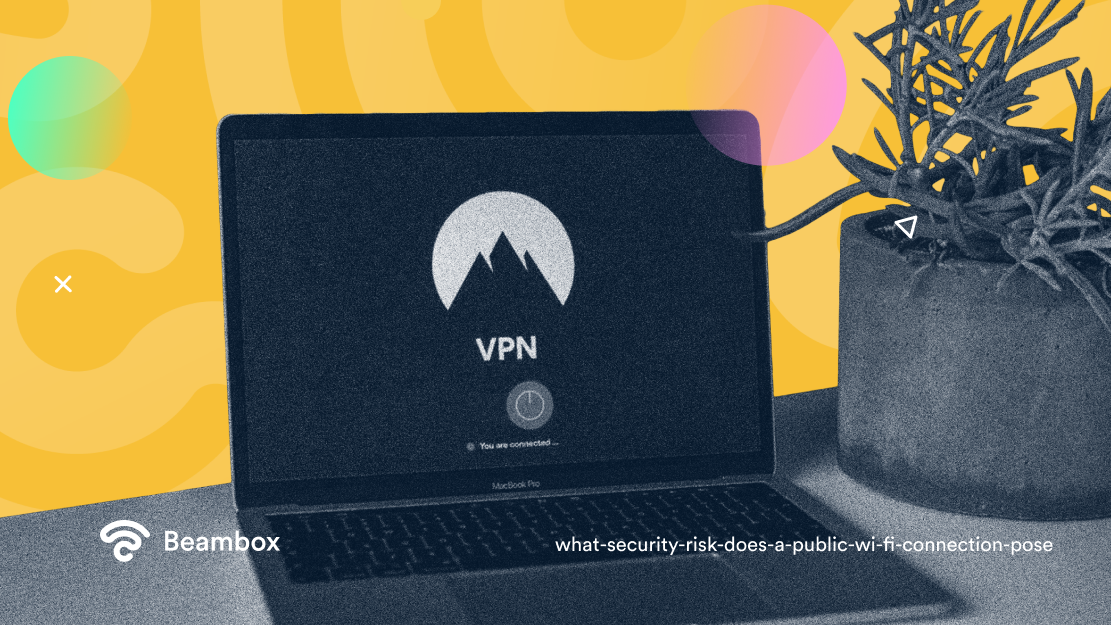
The first and simplest method to mitigate the security risks posed by a public WiFi connection is to use a VPN.
A VPN, or Virtual Private Network, is a private network that encrypts and tunnels Internet traffic through public servers in order to mask the user’s real identity. A VPN can be used for a variety of purposes, such as protecting against malware and online tracking, or bypassing government censorship.
With a VPN, you route, your internet traffic through a VPN server where your data is encrypted and obscured from potential hackers.
Additionally, a VPN can help to mask your IP address and location, making it more difficult for third parties to track your online activity.
There are a few different types of VPNs, such as linked VPNs and remote-access VPNs. Site-to-site VPNs connect entire networks to each other, while remote-access VPNs allow individuals to access a network from anywhere in the world. No matter which type of VPN you use, all data passing through the tunnel is encrypted and secure from eavesdroppers.
If you’re concerned about online privacy, using a VPN is a great way to help protect your information. However, it’s important to choose a reputable VPN service and to understand how the technology works in order to fully benefit from its features. If you want to get started, have a look at these popular VPNs:
#2 Method to Mitigate the Security Risks Posed by a Public WiFi Connection: Use a Firewall
The second method to mitigate the security risks posed by a public WiFi connection pose. A firewall is a piece of hardware or software that acts as a gateway between a trusted internal network and an untrusted external network, such as the Internet. Firewalls are used to protect against unauthorized access and can be configured to allow or deny certain types of traffic.
Firewalls can be either hardware or software, and most routers include a firewall feature. Hardware firewalls are usually more expensive but offer better performance and security. Software-based firewalls are typically easier to set up and manage but may not provide the same level of protection.
When configuring a firewall, it is important to consider what type of traffic should be allowed or denied. For example, if you want to allow web browsing but block email, you would need to configure the firewall accordingly.
#3 Method to Mitigate the Security Risks Posed by a Public WiFi Connection: 2FA
The third method to mitigate the security risks posed by a public WiFi connection is to secure your sensitive account with 2FA.
2FA, or two-factor authentication, is an extra layer of security that can be added to your online accounts. It works by requiring you to enter both a password and a second piece of information, such as a code from your phone or separate devices like Yubikey.
While 2FA does add an extra step to the login process, it can go a long way in protecting your accounts from being hacked. That’s because even if someone manages to steal your password, they won’t be able to log in unless they also have access to the second factor.
Therefore, a 2FA or even a 3FA is recommended to protect your accounts (especially the most important ones) from hijacking or exploitation.
If you’re looking to add an extra layer of security to your online accounts, 2FA is a great option. Just make sure to choose a strong password for the first factor, and don’t reuse passwords across different accounts.
Security Risks Posed by a Public WiFi Connection for Small Business Owners
If you are a business owner offering a free WiFi connection to your customers, you might be targeted by hackers and malicious actors. In fact, the security risks posed by a public WiFi connection you read so far are true for large players such as airports or universities as well as small players like little businesses.
To secure your network, the simplest and most effective way is to grant access only to your real customers (by using a strong password that changes every day. If you want to implement extra security steps, you might think of a firewall and a VPN over your entire WiFi.
If you are looking for a simple way to manage your WiFi network, you can use a social WiFi hotspot like Beambox.
With Beambox you can manage the security of your network and the bandwidth allocation for your customers, to grab a safe and fast connection to all your customers.
Moreover, WiFi marketing solutions offer you dozens of features to automate your marketing and grow your business. With Beambox you can:
- Grow your contact list
- Get more reviews on local review sites
- Manage your WiFi passwords and bandwidth allocation
- Grow a following on social media
- Gather data from your customers
- Run email marketing and SMS campaigns
- Personalize your WiFi and captive portal
Do you want to give it a try? Here is a thirty day free trial!
Get Started With Free WiFi Marketing
Beambox helps businesses like yours grow with data capture, marketing automation and reputation management.
Sign up for 30 days free


